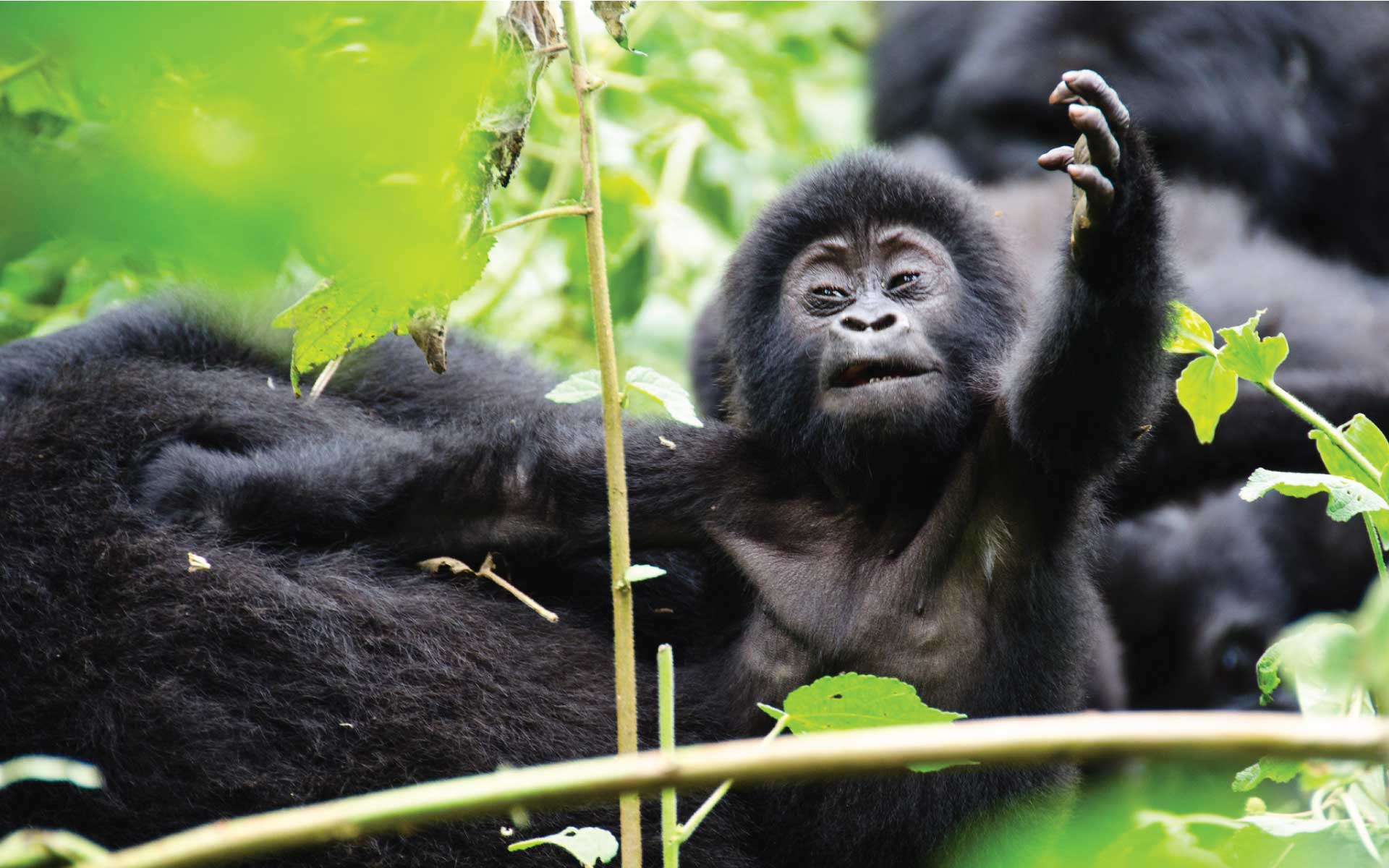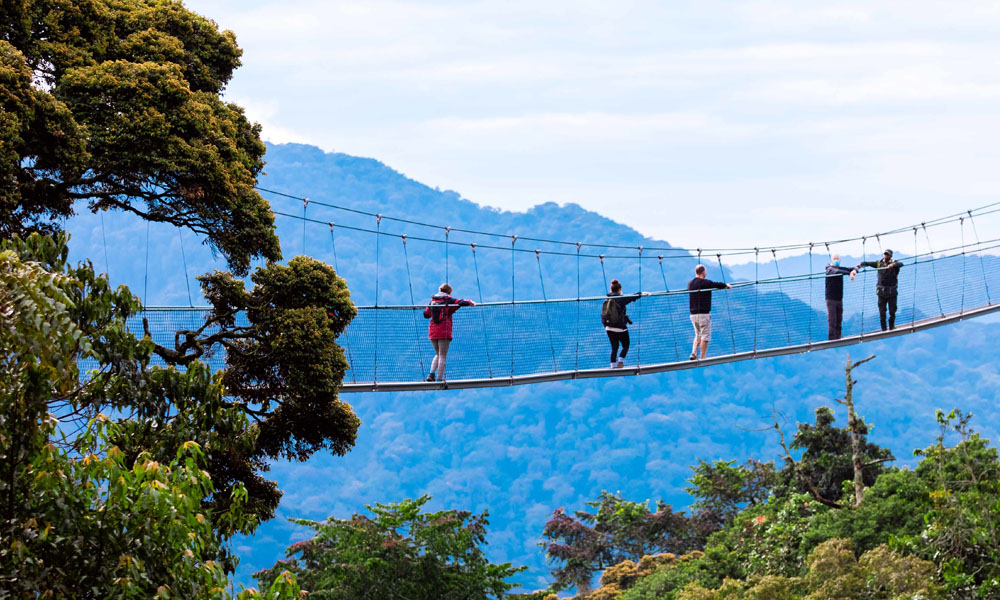
Discovering Rwanda’s National Parks: A Journey into the Heart of Africa
Discovering Rwanda’s National Parks: A Journey into the Heart of Africa. Rwanda, fondly referred to as the “Land of a Thousand Hills,” is celebrated for its picturesque landscapes, rich culture, and remarkable wildlife. Nestled in the heart of East Africa. This small but dynamic country offers a unique safari experience, brimming with biodiversity and unforgettable natural beauty. Rwanda’s national parks serve as sanctuaries for a variety of flora and fauna, with each park offering a distinct experience. In this blog, we will explore four of Rwanda’s most popular national parks in detail. Volcanoes National Park, Nyungwe National Park, Akagera National Park, and Gishwati-Mukura National Park. Through these protected areas, visitors can gain a deeper appreciation for Rwanda’s conservation efforts and enjoy some of Africa’s most spectacular wildlife experiences.

-
Volcanoes National Park: The Crown Jewel of Gorilla Trekking
Located in the northwestern part of Rwanda, Volcanoes National Park is arguably the country’s most renowned natural wonder. The park covers approximately 160 square kilometers and forms part of the Virunga Massif. A chain of volcanoes shared between Rwanda, Uganda, and the Democratic Republic of Congo. While the park is famous for its towering volcanoes, it is primarily known as the sanctuary for the endangered mountain gorillas. Thus making it one of the best places in the world for gorilla trekking.
Gorilla Trekking Experience
One of the park’s biggest attractions is the opportunity to embark on a once-in-a-lifetime gorilla trekking adventure. Every day, small groups of visitors venture into the thick forest to track gorilla families, an activity that is both exhilarating and humbling. Led by experienced guides, trekkers navigate through dense vegetation, climb steep hills, and eventually come face-to-face with these magnificent creatures. The hour spent with a gorilla family is nothing short of magical, as visitors observe their interactions, playful antics, and profound familial bonds. This experience offers a rare insight into the lives of one of the world’s most critically endangered species.
Rich Biodiversity
Beyond gorilla trekking, Volcanoes National Park is home to a diverse range of wildlife and bird species. Golden monkeys, another endangered species, can also be found in the park’s bamboo forests. In addition to primates, visitors may encounter forest elephants, buffalo, and various bird species, making the park an ideal destination for nature lovers. For those interested in more active pursuits, there are opportunities for guided hikes to the summits of several volcanoes, including Mount Karisimbi and Mount Bisoke.
Cultural Significance
Moreover, Volcanoes National Park is steeped in cultural significance. It was here that famed primatologist Dian Fossey conducted her groundbreaking research on mountain gorillas, and visitors can pay homage to her legacy by visiting her tomb and research center. The park also offers cultural experiences with the local communities, allowing tourists to engage with the traditional ways of life in the region.
Nyungwe National Park: A Pristine Tropical Rainforest
Shifting our focus to the southwest of the country, Nyungwe National Park presents a completely different but equally captivating experience. Spanning over 1,000 square kilometers, Nyungwe is one of Africa’s oldest and largest montane rainforests, renowned for its stunning biodiversity and ecological importance. This lush forest ecosystem provides a haven for various species, making it a paradise for wildlife enthusiasts, birdwatchers, and adventure seekers.
Primate Paradise
Nyungwe is particularly famous for its primate population. The park is home to over 13 species of primates, including chimpanzees, which are often the highlight for visitors. Chimpanzee trekking in Nyungwe offers an exciting opportunity to observe these intelligent and social animals in their natural habitat. As trekkers follow their guides deep into the forest, the sounds of chimpanzees calling to one another fill the air, creating an unforgettable atmosphere. Besides chimpanzees, Nyungwe is also home to black-and-white colobus monkeys, L’Hoest’s monkeys, and grey-cheeked mangabeys, all of which can be spotted during guided treks.
Canopy Walk and Hiking Trails
For those who crave adventure, Nyungwe National Park offers a unique canopy walkway experience. Suspended 60 meters above the forest floor, the canopy walk provides breathtaking views of the rainforest and an excellent vantage point for spotting birds and monkeys. Alongside this, the park boasts an extensive network of hiking trails, ranging from short walks to challenging multi-day treks. These trails guide visitors through diverse landscapes, including waterfalls, swamps, and tea plantations that border the forest, providing a holistic and immersive experience.

Birdwatching Haven
Nyungwe is also a birdwatcher’s dream, with over 300 bird species recorded in the park. Some of these species, such as the Rwenzori turaco and the great blue turaco, are endemic to the Albertine Rift region, making Nyungwe a must-visit destination for serious birders. The park’s rich biodiversity is a testament to Rwanda’s commitment to conservation, offering visitors a glimpse into the country’s natural heritage.
-
Akagera National Park: Rwanda’s Classic Safari Destination
Moving eastward, we arrive at Akagera National Park, a stunning contrast to the forested landscapes of Volcanoes and Nyungwe. Covering over 1,100 square kilometers, Akagera is Rwanda’s only savannah park, offering the quintessential African safari experience. The park is named after the Akagera River, which flows along its eastern boundary and feeds into a series of lakes and wetlands that characterize the park’s unique ecosystem.
Big Five Safari
Akagera National Park is home to the “Big Five” – lions, leopards, elephants, rhinos, and buffaloes – making it an essential destination for wildlife enthusiasts. After years of decline due to poaching, the park has seen a remarkable transformation thanks to concerted conservation efforts led by the Rwandan government and African Parks, a non-profit organization. Today, Akagera is thriving, with lions and rhinos successfully reintroduced to the park. Visitors can enjoy thrilling game drives through the savannah, spotting large herds of zebras, giraffes, antelopes, and hippos along the way.
Birdlife and Boat Safaris
In addition to the Big Five, Akagera is also a haven for birdwatchers. Over 480 bird species have been recorded here, including the rare shoebill stork and the African fish eagle. The park’s lakes and wetlands are particularly rich in birdlife, making boat safaris an excellent way to explore these areas while enjoying close-up encounters with hippos and crocodiles. The boat trips on Lake Ihema offer a relaxing yet adventurous experience, ideal for those looking to observe the park’s aquatic life.
Conservation Success Story
Akagera’s remarkable recovery stands as a testament to Rwanda’s commitment to sustainable tourism and wildlife conservation. The park is now one of Africa’s great conservation success stories, and visitors can support these efforts by partaking in guided safaris and conservation-focused tours. Whether it’s a sunrise game drive or a sunset boat cruise, Akagera offers a diverse range of experiences that allow visitors to connect with nature in an intimate and impactful way.

-
Gishwati-Mukura National Park: Rwanda’s Newest Conservation Frontier
Last but not least, we explore Rwanda’s newest national park, Gishwati-Mukura National Park, which was established in 2016. Located in the western part of Rwanda, this park combines two separate forests, Gishwati and Mukura, which were previously degraded due to human activity. However, in recent years, Rwanda has made significant strides in restoring this vital ecosystem, and the park is now a beacon of hope for conservationists.
Restoration and Reforestation
The creation of Gishwati-Mukura National Park is a critical part of Rwanda’s reforestation efforts. The park serves as a wildlife corridor between Volcanoes National Park and Nyungwe National Park. Facilitating the movement of species and promoting biodiversity. Although still in its early stages of recovery. Gishwati-Mukura is already showing promise as a haven for primates, birds, and small mammals.
Primates and Birdlife
The park is home to several primate species, including chimpanzees, golden monkeys, and blue monkeys. Therefore making it a fantastic destination for those interested in primate tracking. Birdwatchers will also be pleased to know that Gishwati-Mukura hosts over 230 bird species. Many of which are endemic to the Albertine Rift. The park’s growing biodiversity is a testament to the success of Rwanda’s conservation efforts, and visitors can enjoy guided nature walks and birdwatching tours in this serene setting.
Community Involvement
Furthermore, Gishwati-Mukura National Park emphasizes the importance of community involvement in conservation. Local communities play a vital role in the park’s restoration and management, with eco-tourism initiatives providing them with alternative livelihoods. Visitors have the opportunity to engage with these communities, learning about their traditional practices and supporting sustainable tourism efforts that benefit both the environment and the people.
Conclusion
Rwanda’s national parks offer a diverse range of experiences that showcase the country’s extraordinary landscapes and wildlife. Whether you are seeking the thrill of gorilla trekking in Volcanoes National Park. The serenity of the rainforest in Nyungwe, the excitement of a Big Five safari in Akagera. Or the conservation-driven experience in Gishwati-Mukura. Rwanda promises to leave you with unforgettable memories. These parks stand as a testament to Rwanda’s commitment to conservation. Therefore ensuring that future generations can continue to enjoy the natural wonders of this remarkable country. As you plan your journey to Rwanda. Each of these national parks offers something unique. Thus making your trip not only an adventure but also a meaningful contribution to the preservation of Africa’s natural heritage.
Related Posts;






